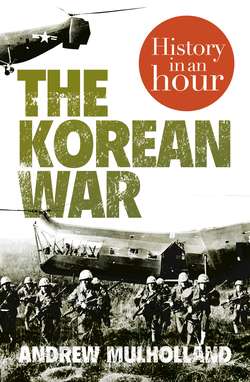Читать книгу The Korean War: History in an Hour - Andrew Mulholland - Страница 4
Introduction
ОглавлениеIt is one of the most militarized stretches of land in the world. The 38th Parallel: de facto border between the two Koreas, still technically at war some sixty years after the armistice was signed. Tense soldiers peer through binoculars across no man’s land, crouched in concrete bunkers shrouded in barbed wire. Artillery batteries are permanently zeroed in, ready to fire. One side has nuclear weapons, and in 2013 declared that it was no longer bound by the 1953 agreement. Korea remains a powder keg.
The war that was fought up the length of this rugged Asian peninsula between June 1950 and July 1953 was very different from what had gone before. Since the Napoleonic period, warfare had been moving towards the extreme of ‘total war’. States would mobilize every resource at their disposal in an all-out effort to bring an enemy to his knees. The Second World War represented the epitome of this trend. Yet Korea was a messy, complicated, deeply political conflict. The simple certainties of unconditional surrender which had applied earlier were absent here. This was a more ‘limited war’ – generals on both sides were constrained not just by resources and the challenges of strategy, but by their political leaders, who walked a tightrope between local objectives and triggering a Third – and ‘total’ – World War. Perhaps for these reasons, it was a war which, in many parts of the world, quickly receded from the public memory. For the West, there did not seem to be a victory to celebrate. It had been a humiliating, drawn-out and expensive affair. There are very few war films about the Korean War and it is not a period given much attention in school curricula. Even academic coverage has been light compared to the Second World War or Vietnam. In China it is still portrayed as a ‘victory’ and for the people of Korea its sacrifices remain very real. In the West, however, it quickly became known as ‘The Forgotten War’.
Yet this was a pivotal event in world history. For the first time, the United Nations met naked aggression with robust military force. Seventeen member states sent troops to the defence of South Korea. Ultimately, despite the twists and turns of the conflict, the tragedies and the controversies, they won. The fact remains that the United Nations stopped an unprovoked attack on one state by another and ejected the attackers by force of arms.
Millions fought in the Korean War, at least 3 million were killed and most of them were civilians. Russian pilots flew combat missions against US aircraft – the only direct acts of war ever between the two emerging super-powers. Chinese troops intervened on a massive scale. President Dwight D. Eisenhower threatened China with nuclear attack. This was no sideshow. At times, the world was on the brink.
Its repercussions are with us to this day. Not just in the continuing security scares in Korea, but in subsequent events such as the Vietnam War, the evolution of the United Nations, the emergence of post-war Japan and the development of NATO (the North Atlantic Treaty Organization), to name just a few.
This, in an hour, is the Korean War.
